Truthout is a vital news source and a living history of political struggle. If you think our work is valuable, support us with a donation of any size.
The State of Mississippi’s Department of Marine Resources (DMR) opened all of its territorial waters to fishing on August 6. This was done in coordination with the National Oceanic and Atmospheric Administration and the US Food and Drug Administration, despite concerns from commercial fishermen in Louisiana, Mississippi, Alabama and Florida about the presence of oil and toxic dispersants from the BP oil disaster.
On August 19, Truthout accompanied two commercial fishermen from Mississippi on a trip into the Mississippi Sound in order to test for the presence of submerged oil. Laboratory test results from samples taken on that trip show extremely high concentrations of oil in the Mississippi Sound.
James “Catfish” Miller and Mark Stewart, both lifelong fishermen, have refused to trawl for shrimp because they believe the Mississippi Sound contains submerged oil.
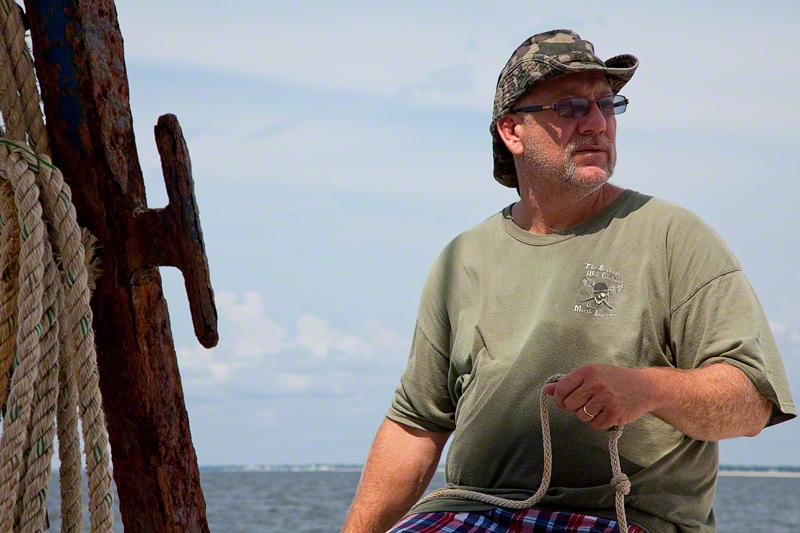
James “Catfish” Miller, third-generation fisherman. (Photo © Erika Blumenfeld 2010)
“I can’t tell you how hard it is for me not to be shrimping right now, because I’m a trawler,” Miller told Truthout as he piloted his shrimp boat out of Pass Christian Harbor, “That’s what I do. I trawl.”
But Miller and Stewart have been alarmed by their state’s decision to reopen the waters, and have been conducting their own tests for oil in areas where they have fished for years. Their method was simple – they tied an absorbent pad to a weighted hook, dropped it overboard for a short duration of time, then pulled it up to find the results.
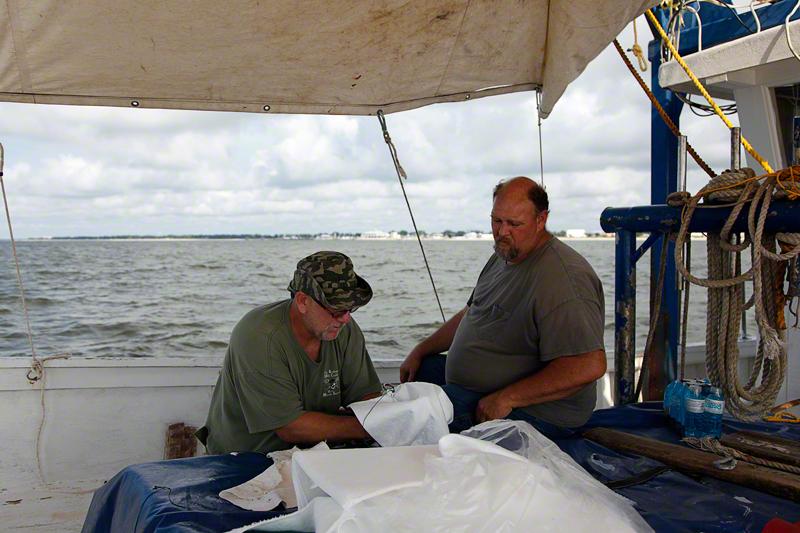
Miller and Mark Stewart attaching the sorbent pad to the weighted hook. (Photo © Erika Blumenfeld 2010)
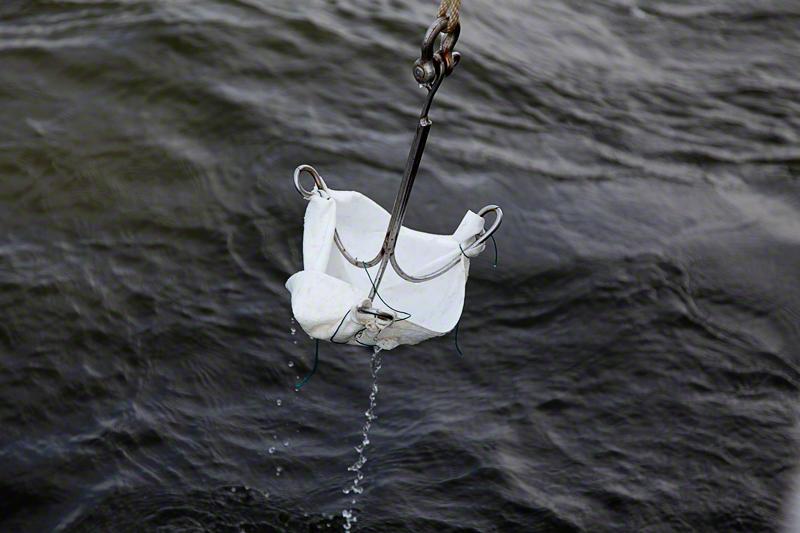
(Photo © Erika Blumenfeld 2010)
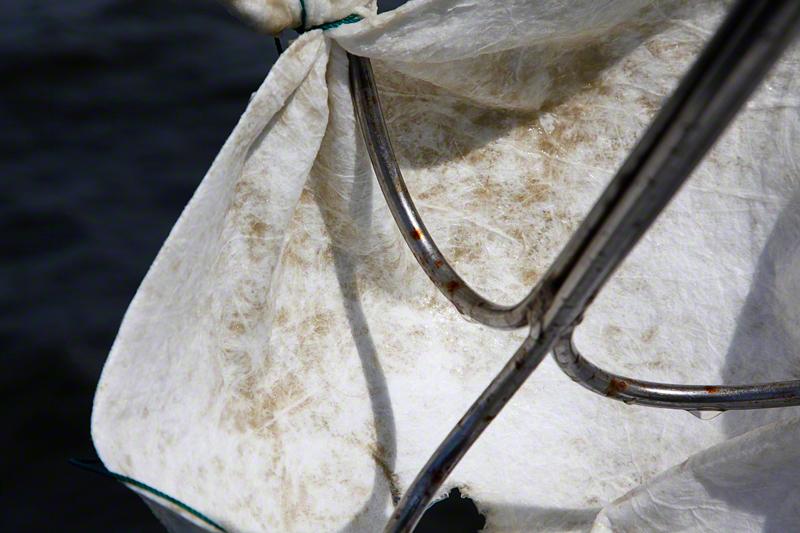
(Photo © Erika Blumenfeld 2010)
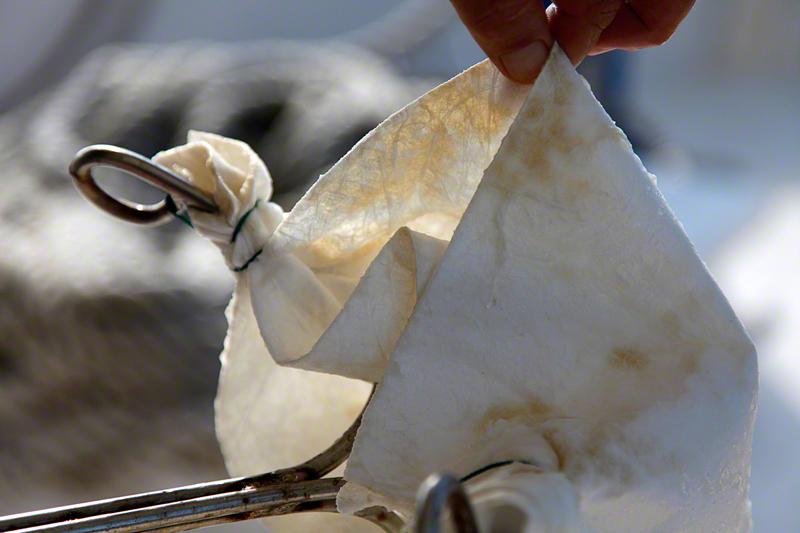
(Photo © Erika Blumenfeld 2010)
On each of the eight tests Truthout witnessed, the white pads were brought up covered in a brown oily substance that the fishermen identified as a mix of BP’s crude oil and toxic dispersants.
The first test conducted was approximately one-quarter mile out from the harbor, and the pad pulled up was stained brown.
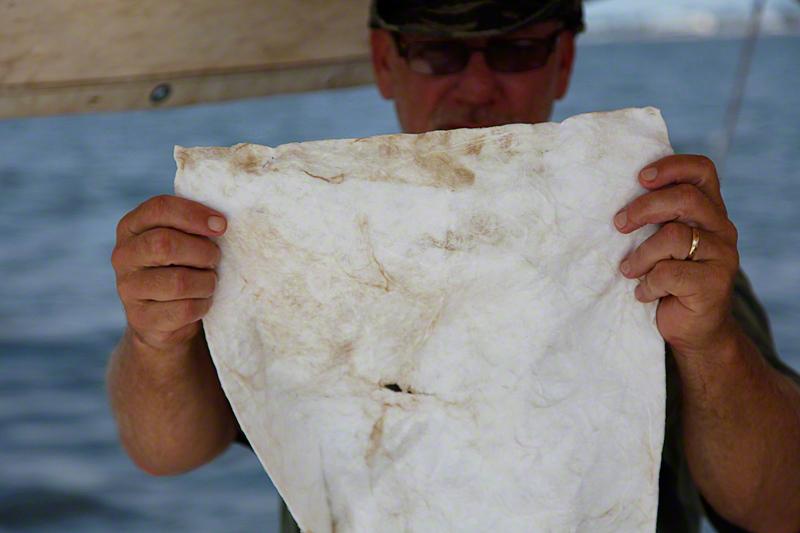
(Photo © Erika Blumenfeld 2010)
“They’re letting people swim in this,” Miller exclaimed, while holding the stained pad up to the sun.
Miller and Stewart were both in BP’s Vessels Of Opportunity (VOO) program and were trained in identifying oil and dispersants.
This writer took two samples from two absorbent pads that were brought up from the water that were covered in brown residue and had them tested in a private laboratory via gas chromatography.
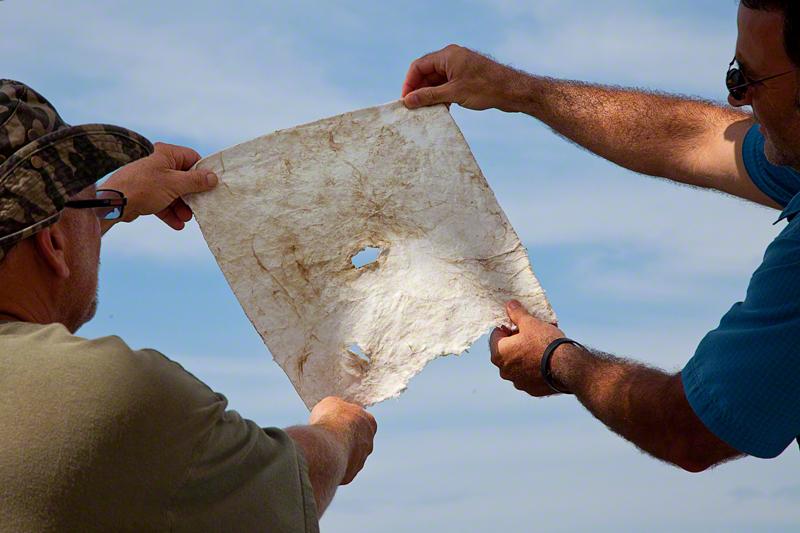
Miller and Dahr Jamail holding oil-soaked sorbent pad. (Photo © Erika Blumenfeld 2010)
The environmental analyst who worked with this writer did so on condition of anonymity, and performed a micro extraction that tests for Total Petroleum Hydrocarbons (TPH). The lower reporting limit the analyst is able to detect from a solid sample like the absorbent pad is 50 parts per million (ppm).
The first sample this writer took was from a sorbent pad dropped overboard to a depth of approximately eight feet and held there for roughly one minute. The location of this was 30 18.461 North, 089 14.171 West, taken at 9:40 AM. This sample tested positive for oil, with a hydrocarbon concentration of 479 ppm. Seawater that is free of oil would test at zero ppm of hydrocarbons.
The second sample this writer took was from a sorbent pad dropped overboard to a depth of approximately eight feet and held there for roughly one minute. The location of this was 30 18.256 North, 089 11.241 West, taken at 10:35 AM. This sample tested positive for oil, with a hydrocarbon concentration of 587 ppm.
“For the sorbent pads, I had to include the weight of the actual pad itself, so that the extraction was done as a solid,” the environmental analyst explained. “Had I had enough liquid in these samples to do a liquid extraction, the numbers would have been substantially higher.”
Jonathan Henderson, with the nonprofit environmental group, Gulf Restoration Network, was on board to witness the sampling.

Jonathan Henderson, coastal resiliency organizer of the Gulf Restoration Network. (Photo © Erika Blumenfeld 2010)
“I can verify that the shrimp boat captain retrieved what appeared to be an oily residue,” Henderson told Truthout. “My suspicion is that it was oil. It felt like oil to the touch, and it smelled like oil when you sniffed it.”
On August 11, the two fishermen brought out scientist Dr. Ed Cake of Gulf Environmental Associates. (Video from the “Bridge the Gulf Project” of that trip with Miller and Stewart finding an oil and dispersant mixture on open Mississippi fishing waters.)
Dr. Cake wrote of the experience: “When the vessel was stopped for sampling, small, 0.5- to 1.0-inch-diameter bubbles would periodically rise to the surface and shortly thereafter they would pop leaving a small oil sheen. According to the fishermen, several of BP’s Vessels-of-Opportunity (Carolina Skiffs with tanks of dispersants [Corexit?]) were hand spraying in Mississippi Sound off the Pass Christian Harbor in prior days/nights. It appears to this observer that the dispersants are still in the area and are continuing to react with oil in the waters off Pass Christian Harbor.”
Shortly thereafter, Miller took the samples to a community meeting in nearby D’Iberville to show fishermen and families the contaminated sorbent pads. At the meeting, fishermen unanimously supported a petition calling for the firing of Dr. Bill Walker, the head of Mississippi’s DMR, who is responsible for opening the fishing grounds.
On August 9, Walker, despite ongoing reports of tar balls, oil and dispersants being found in Mississippi waters, declared “there should be no new threats” and issued an order for all local coast governments to halt ongoing oil disaster work being funded by BP money that was granted to the state.
Recent weeks in Mississippi waters have found fishermen and scientists finding oil in Garden Pond on Horn Island, massive fish kills near Cat Island and Biloxi, “black water” in Mississippi Sound, oil inside Pass Christian Harbor and submerged oil in Pass Christian, in addition to what Miller and Stewart showed Truthout and others with their testing.
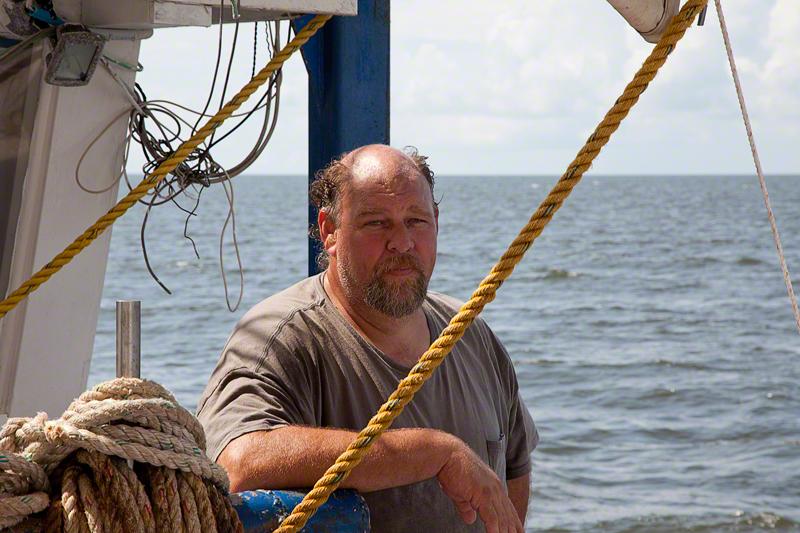
Stewart, third-generation fisherman. (Photo © Erika Blumenfeld 2010)
“We’ve sent samples to all the news media we know, here in Mississippi and in [Washington] D.C.,” Stewart, a third-generation fisherman from Ocean Springs told Truthout, “We had Ray Mabus’ people on this boat, and we sent them away with contaminated samples they watched us take, and we haven’t heard back from any of them.”
Raymond Mabus is the United States Secretary of the Navy and a former governor of Mississippi. President Obama tasked him with developing “a long-term Gulf Coast Restoration Plan as soon as possible.”
Mabus has been accused by many Gulf Coast fishermen of not living up to his task.
Thus, since neither the federal nor state governments will conduct the testing they feel is necessary, Miller and Stewart decided to take matters into their own hands.
Stewart had on board another homemade method of capturing oil in the water column. He took two tomato cages and filled them with sorbent pad, layered it in plastic to hold it together, and left a hole at the bottom for the water to flow through, creating a large sorbent cone that could flow through the water.
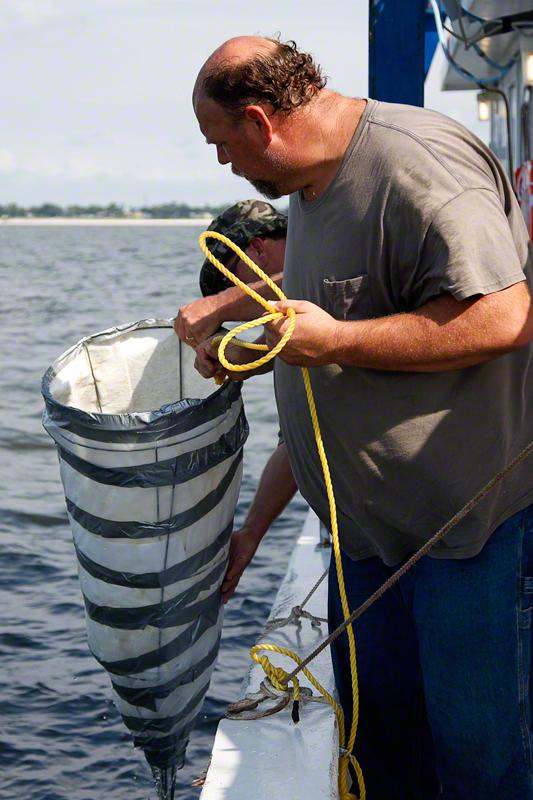
(Photo: Erika Blumenfeld)
The method proved fruitful. After several tests in the water column, being careful to never let it touch bottom, the cone was turned a dark brown with what turned out to be a very high concentration of oil.
“Normally we have a lot of white shrimp in the Sound right now,” Stewart told Truthout of the current situation in the Mississippi Sound. “You can catch 500-800 pounds a night, but right now, there are very few people shrimping, and those that are, are catching nothing or maybe 200 pounds per night. You can’t even pay your expenses on 200 pounds per night.”
“We think they opened shrimp season prematurely,” Miller told Truthout. “How can we put our product back on the market when everybody in America knows what happened down here? I have seen so many dead animals in the last few months I can’t even keep count.”
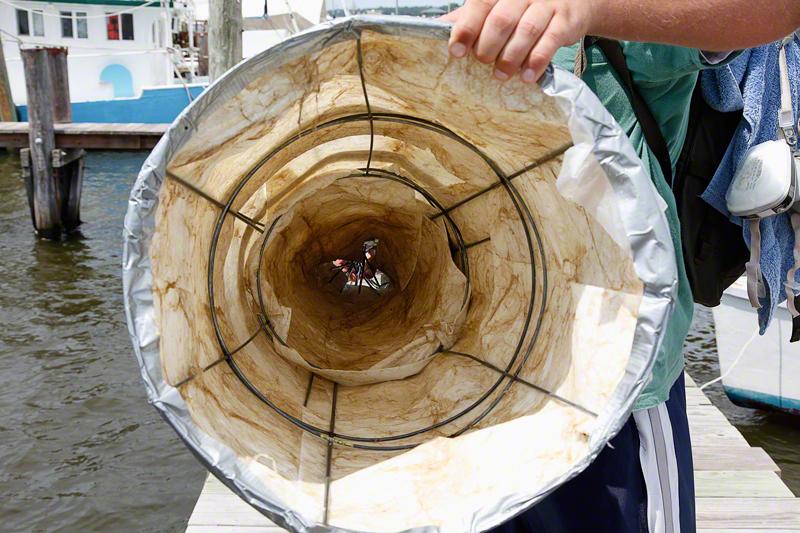
Jonathan Henderson holding the oil-soaked sorbent cone. (Photo © Erika Blumenfeld 2010)
On August 19, several commercial shrimpers, including Miller and Stewart, held a press conference at the Biloxi Marina. Other fishermen there were not fishing because they feared making people sick from toxic seafood they might catch.
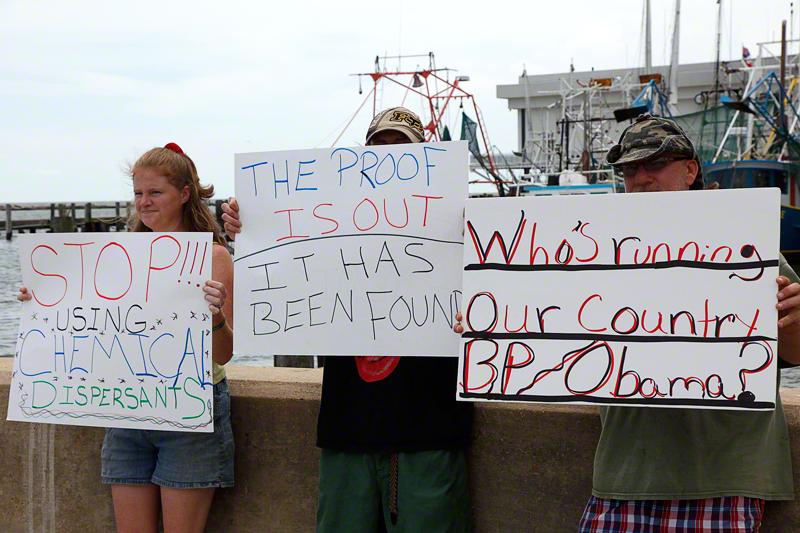
(Photo © Erika Blumenfeld 2010)
“I don’t want people to get sick,” Danny Ross, a commercial fisherman from Biloxi told Truthout. “We want the government and BP to have transparency with the Corexit dispersants.”
Ross said he has watched horseshoe crabs trying to crawl out of the water and other marine life like stingrays and flounder also trying to escape the water. He believes this is because the water is hypoxic due to the toxicity of the dispersants, of which BP admits to using approximately 1.9 million gallons.
“I will not wet a net and catch shrimp until I know it’s safe to do so,” Ross added, “I have no way of life now. I can’t shrimp and others are calling the shots. For the next 20 years, what am I supposed to do? Because that’s how long it’s going to take for our waters to be safe again.”
David Wallis, another fisherman from Biloxi, attended the press conference. “We don’t feel our seafood is safe, and we demand more testing be done,” Wallis told Truthout. “I’ve seen crabs crawling out of the water in the middle of the day. This is going to be affecting us far into the future.”
“A lot of fishermen feel as we do. Most of them I talk to don’t want the season opened, for our safety as well as others,” Wallis added. “Right now there’s barely any shrimp out there to catch. We should be overloaded with shrimp right now. That’s not normal. I won’t eat any seafood that comes out of these waters, because it’s not safe.”
Miller told Truthout that when he worked in BP’s VOO program, “I came out here and looked at the oil and they didn’t let us clean it up most days. Instead, I watched them spray dispersants on it at night, and now we’re seeing acid rain burn holes in our plants. I’ve seen them spray Corexit from Carolina Skiffs with my own eyes. For the last several weeks now they keep shoving these lies in our face. You can only turn your head so far, for so long.”
The hydrocarbon tests conducted on the samples taken by this writer only represent a tiny part of the Gulf compared to the massive area of the ocean that has been affected by BP’s oil catastrophe. A comprehensive sampling regime across the Gulf, taken regularly over the years ahead, is clearly required in order to implement appropriate cleanup responses and take public safety precautions.
On their own, Miller and Stewart have made at least seven sampling runs, covering many tens of miles of the Mississippi Sound, and have, in their words, “rarely pulled up a sorbent pad that did not contain oil residue.”
A terrifying moment. We appeal for your support.
In the last weeks, we have witnessed an authoritarian assault on communities in Minnesota and across the nation.
The need for truthful, grassroots reporting is urgent at this cataclysmic historical moment. Yet, Trump-aligned billionaires and other allies have taken over many legacy media outlets — the culmination of a decades-long campaign to place control of the narrative into the hands of the political right.
We refuse to let Trump’s blatant propaganda machine go unchecked. Untethered to corporate ownership or advertisers, Truthout remains fearless in our reporting and our determination to use journalism as a tool for justice.
But we need your help just to fund our basic expenses. Over 80 percent of Truthout’s funding comes from small individual donations from our community of readers, and over a third of our total budget is supported by recurring monthly donors.
Truthout’s fundraiser ended last night, and we fell just short of our goal. But your support still matters immensely. Whether you can make a small monthly donation or a larger one-time gift, Truthout only works with your help.
